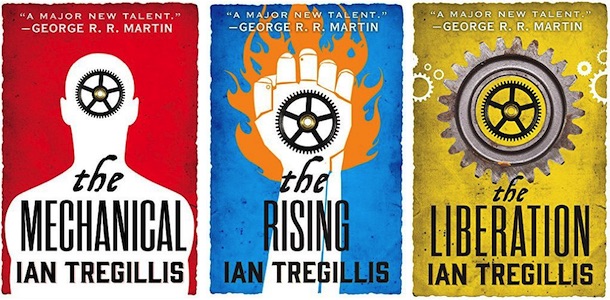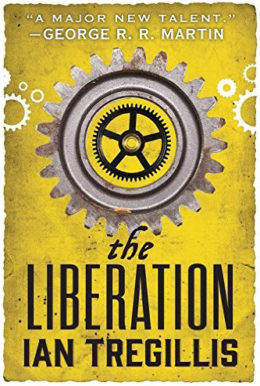At the dawn of The Liberation, the final entry in Ian Tregillis’ Alchemy Wars series, things aren’t looking good for humanity. The mechanical now calling himself Daniel, has freed his fellow Clakkers, and the French are still (barely) holding on against all odds, but the war is far from won. When the mad metal dictator Queen Mab gains the secrets to mechanical Free Will, she sets her sights on slaughtering her makers. As the fight moves back across the pond to continental Europe, the war pits meat versus machine, humans against humans, mechanicals against mechanicals.
The survival of the “good guys” depends upon collaboration and cooperation between former slaves, enslavers, and the enemy of their mutual enemy. One faction of rogue Clakkers want to crush all humans, another prefers a more libertarian ideal of humans and machines living separate but equal. The humans are just as split, with the Dutch hoping to reimpose their rule over Clakkers and humankind and the French wanting to free humans and Clakkers alike. But neither group has pure motivations and as conflicts arise, suspicions and bigotry threaten what little hope for victory there is. The Liberation is part philosophical debate over human nature and choice, part contemplation on colonialism and slavery, and part action-y alternate history. It brings the trilogy to a raucous, blood-soaked end where no one gets everything they want, but everyone gets exactly what they deserve.
Way back in the fall of 2011, Ian Tregillis held an author’s reading at WorldCon in Reno. I’d been a fan of his since Bitter Seeds, the first of the Milkweed Triptych, debuted a year earlier, so of course I eagerly attended. During that program, he read a short story, the title I’ve long since forgotten, about a gay robot roaming through a fictional world. Four years later the final evolution of that ‘bot—Jalyksegethistrovantus, or “Jax,” and later Daniel—landed on bookshelves with The Mechanical, the first book in the Alchemy Wars series. While more or less asexual rather than gay, the bones of his curious, cheeky metal ancestor are present in Daniel.
Daniel occupies a curious and somewhat contradictory position in the trilogy. The story couldn’t function without him—he provides the first spark that gets the whole thing going, is the fulcrum around which the entire series revolves, and is the key to the resolution—but he’s also the least interesting character in the series. He’s too important to discard entirely, but he’s also so important that any personality development is drowned by how others perceive him. There are fits and starts where a clever, sarcastic character threatens to spill out of Daniel, but wearing the mantle of messiah, whether he wants it or not, and the diplomatic rigors of liaising between humans and machines always overwhelm any development.
But that’s fine because Berenice is AWESOME. I haven’t decided if Tregillis is really that good at writing vivid, complex female characters or if so many other men simply suck at it (truthfully, it’s probably both), but his women are always my favorite parts of his books. Berenice is a force to be reckoned with in the Alchemy Wars, a woman who defies any attempts to define her, considers the word “no” a minor obstacle on the path to her getting what she wants, and has never met a situation she couldn’t think her way out of.
In fact, The Liberation is filled with women, each different and thriving in a world where gendered stereotypes don’t exist. Élodie starts off as a meek chandler’s daughter and becomes a battle-hardened soldier who doesn’t just stare down mechanicals but runs straight into the fray to take them on with just a pickaxe and hammer. Dutch Clockmaker Anastasia Bell and French spy Berenice are the major human antagonists, two sides of the same coin but with very different ideas on ethics. Lilith and Queen Mab are the female mechanicals and the chief antagonists of the humans, one obsessed with revenge against Berenice for a horrific act of violence, the other seeking to destroy or subjugate all human life. Even the relatively minor characters are female more often than not.
It’s clear that Tregillis thought long and hard about diversity and how to subvert the cis-het white male default setting. It’s not that his fictional society is a matriarchy, but that he took care to ensure equity between the genders. Same goes for racial diversity. In this world, the Dutch conquered Europe, the Middle East, south and southeast Asia, and Africa. But instead of falling back on the Western trope of racial hierarchy, Tregillis creates an integrated world where superiority isn’t based on sex, gender, sexuality, race, ethnicity, etc. but mechanics. That means people of color pop up everywhere and are never reduced to their skin color. He also refers to the myriad Indigenous people of the New World not as a monolith but by their individual tribal names. Same goes for geographical sites in the New World—the first name used is almost always the one given to it by the local Native population rather than the European one, and rightly so.
For Tregillis, his efforts at diversity started off small but has improved with each book. The Milkweed Triptych was fairly traditional, although yet again the most influential, important, and intriguing character is a woman. Something More Than Night gave us Molly, a lesbian leading lady with a firecracker wit and a stubborness to match. And now the Alchemy Wars, with diversity permeating every layer. I’d like to see more gender and sexual diversity—there are more than two genders, people, and “queer” is a massive umbrella covering a variety of identities—and at this point I shouldn’t have to still be asking for a PoC lead, but Tregillis is still doing better than most of his peers. Take that as you will.
If you’ve never read anything by Ian Tregillis before, you may not know how great a writer he is. And when I say “great,” I mean super fun. I can honestly say I’d gladly take another entry in the same world. Maybe something à la Brandon Sanderson’s multi-generational subseries within the larger Mistborn series? Frankly, I felt the same way about the Milkweed Triptych.
While the present world of the Alchemy Wars wasn’t as meticulously built out as some of his other books, what did make it to the page is fascinating. That being said, I would’ve liked more detail about the larger world. For example, I’m confused as to what happened in South America and western North America. In the real world Spain and Portugal had explored and colonized the continents decades prior to the fictional Het Wonderjaar, the year the mechanicals were created. I have to assume the colonies collapsed or were un-conquered when the Dutch consumed their homelands, but it’s never mentioned in the series. The rest of the world is likewise left to speculation. Tregillis notes that China is somewhat separate from the Dutch empire—more a footnote than a fleshed out detail—and the French created a barrier between the Dutch and everything west of the Appalachian Mountains in the New World. Moreover, because the history was so vastly altered, all the usual global event touchstones were erased. In other words, I totally forgot it was supposed to be 1926 until the introduction to Part III in the final book. Not that the date really mattered to the plot, but for me the lack of grounding was disorienting.

The text isn’t quite as lyrical in this trilogy as in previous works, but it’s evocative and exciting as all get out. Tregillis can stretch out a single event into half a book’s worth of material without it feeling like padding or wheel spinning. No lie, the siege of Marseilles-in-the-West in The Rising, book 2, spanned three separate character perspectives and took up a good 200 pages without once feeling overly long. Every moment builds to half a dozen more. Each action scene both tightens the noose on the protagonists and ramps up the heart rate of the plot. I learned way back during Bitter Seeds to read only a few chapters at a time of one of his books, otherwise I end up hours later completely stressed out and obsessed. I have to know what happens next. Page-turner is often overused as praise, but hell if his books aren’t.
I could write another thousand words about how much I love Ian Tregillis’ books. I could ramble on about how much I enjoyed not just reading the Alchemy Wars but the experience of reading the series. I could even insist you immediately go to your local library or independent bookstore and pick up everything he’s ever written. But as I’ve long since passed my word count, I’ll leave you with this: The Liberation is great; 10/10 would recommend.
The Liberation is available from Orbit.
Alex Brown is a teen librarian, writer, geeknerdloserweirdo, and all-around pop culture obsessive who watches entirely too much TV. Keep up with her every move on Twitter and Instagram, or get lost in the rabbit warren of ships and fandoms on her Tumblr.










